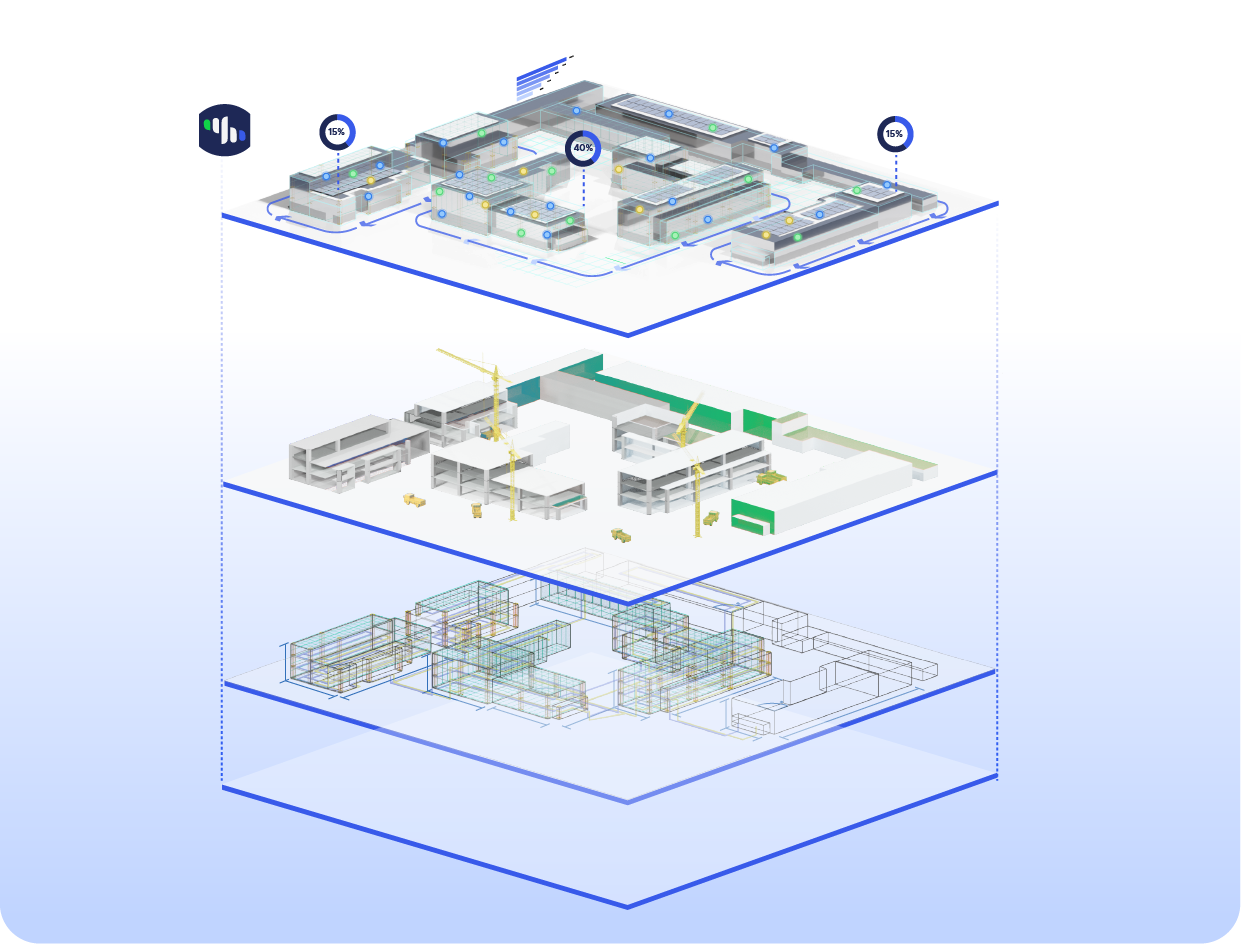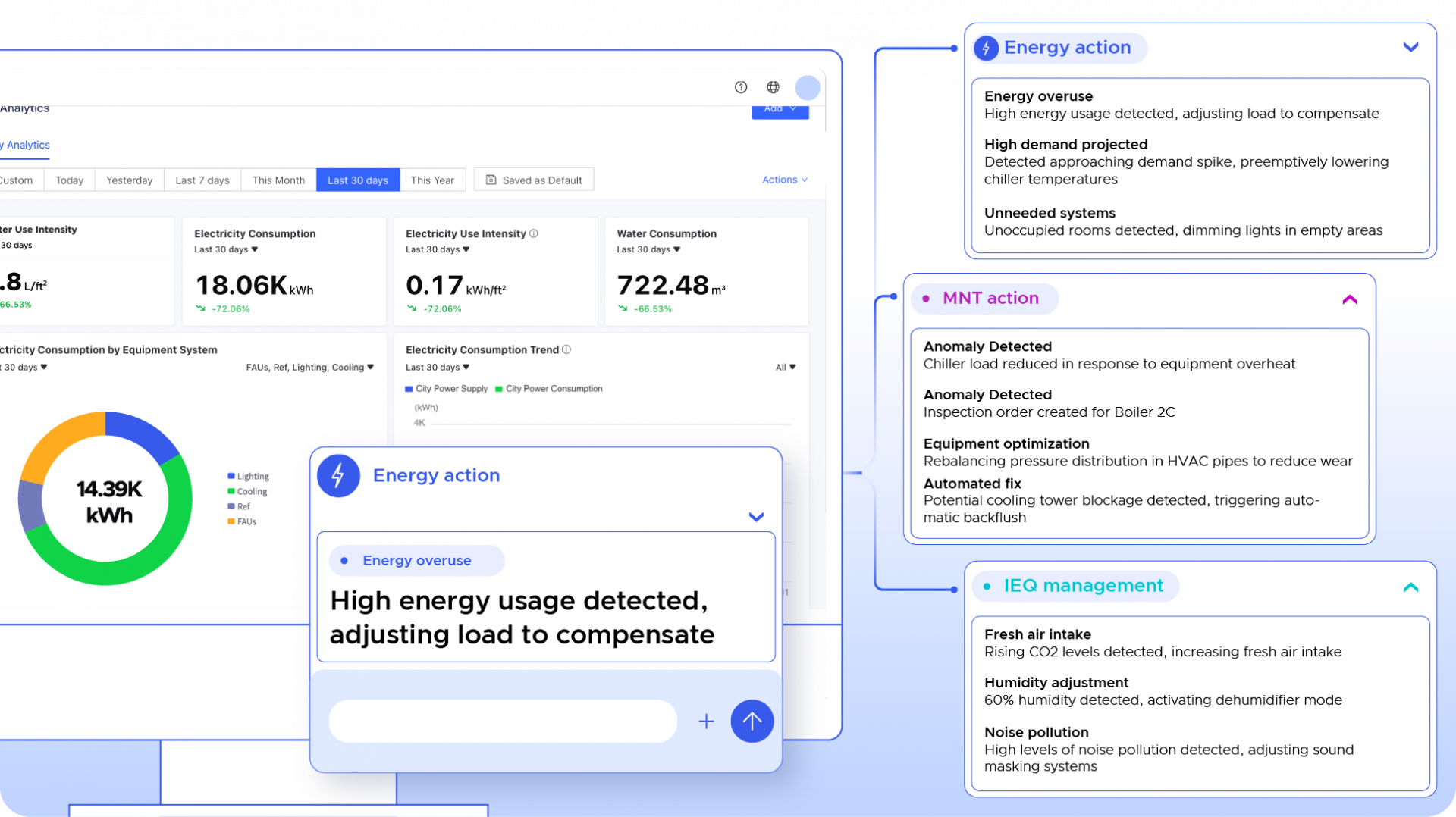Research & development
Digital twins: Pioneering AI adoption in the built environment
Over the past 40 years, industries like aerospace and automotive have undergone a digital revolution, leveraging advanced 3D modeling and simulation. In contrast, the construction and real estate sectors have lagged behind in adopting these technologies. However, with the rise of stringent energy and carbon regulations, the built environment is now undergoing rapid digitalization—driven by the need for smarter, more sustainable operations. Digital twins are at the forefront of this transformation, bridging the gap between physical assets and AI-powered insights.

The common data thread across a building’s lifecycle
In the aerospace and automotive industries, “digital continuity” ensures that a 3D model—and its associated data—evolves seamlessly from design to manufacturing and through to aftersales. But what serves as this continuous data thread in the lifecycle of a building?
Many might point to Building Information Modeling (BIM) as the answer. However, from Akila’s perspective, BIM represents only one phase of digital continuity—primarily in design and construction.
Beyond BIM, the true foundation for long-term data continuity is the digital twin. Unlike static BIM models, a digital twin integrates multiple dynamic data layers—3D models, IoT sensor data, operational insights, and more. This evolving model enables a building’s data to be leveraged in different ways across its entire lifecycle, supporting everything from energy optimization to predictive maintenance and long-term sustainability.


Building in operation: Turning data into action
Akila’s platform is designed to optimize a building’s operational phase, empowering owners and tenants to monitor, analyze, and act on critical factors such as energy consumption, maintenance efficiency, and workspace management.
Unlike the aerospace and automotive industries—where dedicated engineers oversee every detail—buildings rarely have full-time experts managing every operational aspect. Facility teams are stretched thin, focusing on daily tasks with limited capacity for complex analysis or portfolio-wide decision-making.
With this reality in mind, what value do the countless data systems, expert platforms, and SaaS solutions on the market truly provide? Without seamless integration and actionable insights, data alone is not enough. Akila bridges this gap by transforming fragmented information into intelligent, automated decision-making, enabling teams to work smarter, not harder.
AI as an enabler: Augmenting human expertise
While AI is often seen as a potential replacement for human roles, its true impact lies in enhancing human decision-making—providing insights, recommendations, and automation to improve efficiency.
Akila captures real-time field data, monitoring electricity consumption at the multi-equipment level across hundreds of facilities worldwide. But raw data alone isn’t enough. To accurately benchmark a site’s energy use, one must factor in weather patterns, operational anomalies, equipment age, and more.
The sheer scale of data processing required for meaningful consumption and savings analysis is immense. This is why Akila is actively developing AI-driven capabilities—not to replace human expertise, but to empower facility teams with deeper insights, automated benchmarking, and smarter decision-making.


3D as a data source of AI
With the rise of Large Language Models (LLMs), the public has grown accustomed to interacting with knowledge bases through natural language. Akila users can already envision the value of applying this interaction to their building portfolio data—but what about extending it to the entire digital twin?
A digital twin is more than just data; it is a real-time, spatially aware representation of a building and its assets. Imagine a future where a real estate manager can engage with their digital twin in natural language—asking about their facility’s performance ranking, identifying key improvement actions, and even validating simulation scenarios to predict post-retrofit outcomes.
By integrating 3D spatial data into AI-powered insights, Akila is making this future a reality—bridging the gap between complex building data and intuitive, actionable decision-making.
Akila is committed to making this vision a reality
Akila is the only company operating a global digital twin platform specifically designed for the real estate industry. While most players in our ecosystem focus either on vertical solutions (such as maintenance or energy management) or operate at a highly generalized level (like ESG platforms), Akila bridges the gap—offering a fully integrated, scalable solution.
Unlike our competitors – fast-growing but regionally constrained, Akila has the unique ability to scale across global real estate portfolios, delivering consistent, data-driven insights at an unparalleled level. This capability sets us apart, enabling seamless benchmarking, optimization, and predictive analytics across diverse asset portfolios.
This is why, in collaboration with NVIDIA, we are advancing the frontier of AI-powered digital twins. With a 60-person strong R&D team, including 20 experts specializing in AI and OpenUSD formats, Akila is committed to being the first to deliver truly intelligent digital twin use cases to the market.
Global responsibility, visionary leadership
We are positive, fearless, and open — our culture enables us to pursue growth and learning together.

Philippe OBRY
Vice President

Anna DAI
Chief Technology Officer

Zachary GOODNOUGH
Chief Product Officer

David ARSENAULT
Technology Strategy Officer
We’ve got your back, no matter your stack

Analytics & dashboarding

Energy optimization

Work-order management
Buildings, portfolios, people. It’s time to connect the dots.